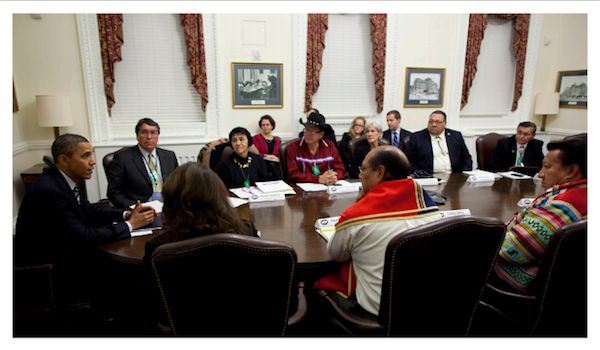White House Hosts 2012 Tribal Nations Conference


The White House held its annual Tribal Nations Conference yesterday at the Department of Interior in Washington, D.C. The President welcomed representatives from 566 federally recognized tribes to address concerns specific to America’s native communities.
Native Americans make up just over 1 percent of the US population, but have significantly higher rates of poverty and unemployment than the national average. Poverty, domestic abuse, and health issues are persistent on reservations.
Prior to the conference’s commencement, the National Conference of American Indians made clear their worry about the upcoming fiscal cliff. If no resolution is found, tribes could see significant cuts to the absolutely vital funding on which they rely. President of the NCAI, Jefferson Keel emphasized:
“Tribal nations are part of the American family of governments, and we know everyone in that family must identify budget efficiencies to keep America moving forward. However, the federal responsibility to tribal nations is not driving the deficit. In fact tribal programs, as part of the discretionary budget, have already done their part to reduce the deficit following the recommendations of the Simpson-Bowles commission and enacted through the bipartisan Budget Control Act. Federal responsibilities are already significantly underfunded and the problems we are working hard to confront will only be exacerbated if treaty obligations are treated as line items,”
Other organizations that serve the sovereign nations, including the Indian Health Service and the Bureau of Indian Affairs, also addressed concern about the budget. Those organizations only make up .12 and .007 percent of federal spending, respectively. Cuts to these programs would disproportionately affect Native communities, which already experience a number of socioeconomic challenges and barriers to prosperity and development.
Additionally, the environment remains a contentious issue between the government and tribes. Hillary Tompkins, Solicitor for the Department of the Interior and a member of the Navajo Nation noted these concerns:
“It is part of our health, identity, and way of life. Environmental protection is key to preserving our culture…there was much discussion about concern with mining and other mineral development,” she said, “There needs to be strong government-to-government consultation when making decisions about mineral development.”
Development of Native lands and the potential health hazards engendered from mining and dumping have been long-standing and of increasing concern.
A White House report titled Continuing the Progress in Tribal Communities, released just prior to the conference, detailed the government’s plan to ensure a future for tribal nations and addressed some of these concerns. Throughout his last four years in office, President Obama has been dedicated to improving the lives of indigenous communities and to their development and progress. The president has promised his continued support during his second term.
As he addressed conference attendees, the president praised those involved in their communities who are determined to ensure a better way of life for future generations. “And over the next four years, as long as I have the privilege of serving as your President, we’re going to keep working together to make sure that the promise of America is fully realized for every Native American,” said the president, as he closed his speech by reiterating his promise to support efforts of self determination and development.



